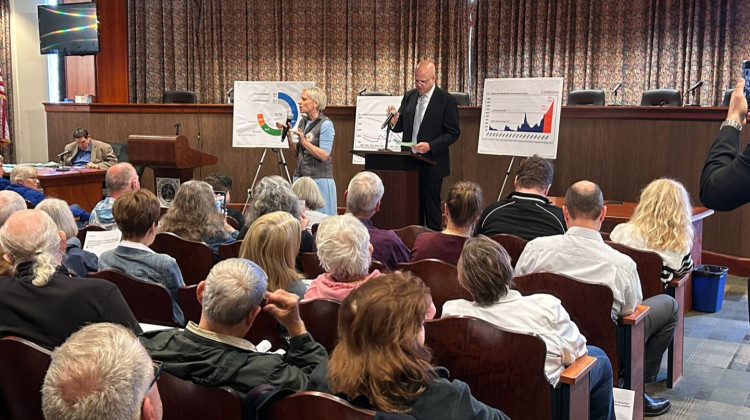After George Floyd was murdered by a police officer, cities across the country, including Indianapolis, worked to involve civilians more in law enforcement.
Last fall, the Indianapolis City-County Council passed a proposal to reform the police department’s Use of Force Review Board to include a civilian majority. While experts say this is a step in the right direction, some say the board can’t hold officers accountable and isn’t transparent enough with the community.
To bring us more on national trends in police oversight, WFYI’s criminal justice reporter Katrina Pross spoke with Cameron McEllhiney, the director of training and engagement for the National Association for Civilian Oversight in Law Enforcement.
Katrina Pross, WFYI: What trends are we seeing nationally in terms of civilian involvement and police oversight?
Cameron McEllhiney, National Association for Civilian Oversight in Law Enforcement: So I think one of the first things to mention is just the number of cities that are looking to implement it. Although it's been around for a very long time, but we saw them mostly in larger cities. So you know, Philadelphia, DC, New York, now it’s much more common to see them in cities that are under 100,000 in population. And so that is one of the biggest trends that we're seeing recently.
Pross: Did the murder of George Floyd sparked an increase in civilian involvement? And if so, why?
McEllhiney: Absolutely. One of the issues that we see surrounding the murder of George Floyd, the issues of over policing, police brutality, of people of color being treated aggressively by police, Black men being killed by them, those are not new issues. But there was absolutely something so horrifying about the video. And it really affected people, I think, in a way that other videos unfortunately, had not
Pross: These oversight boards that have civilians on them, like what powers should they have
McEllhiney: Civilian review boards have changed significantly, they're gaining authorities that make them a more proactive body, rather than reactive, because when you're a reactive body, you have to wait for misconduct to happen to do anything about it. Whereas now they're having things like they're able to review policies and procedures, they're able to make recommendations for changes not only in policies and procedures, but also training now that we're seeing them be able to do those things. We have oversight boards, who are now able to make those recommendations and make changes so that perhaps there isn't the next complaint.
Pross: Should oversight boards with civilians on them keep the community informed on what they're doing?
McEllhiney: They absolutely should. So in most cities, where you find a civilian oversight board, you see them do those annual reports, they do a lot of community outreach events. And so it's not only engaging with the community to let them know what's going on, not only with law enforcement in the community, but also with the oversight entity as well. It also is a way for them to get input from the community to solicit their involvement. And that input piece is so valuable so that you actually know what are the concerns of the community? Are you even addressing them?
Pross: Indianapolis’ Use of Force Review Board has a civilian majority, there's a police officers that sit on this board as well. But the board can't recommend discipline of officers, they can't do their own investigation. Meetings are completely closed to the public. What kind of response do you have to that set up?
McEllhiney: I believe that the Use of Force Board being established in Indianapolis is a really good step, that they've allowed civilians on there, because that’s increasing trust in the process, anytime you can have community as part of the process. What they can't see and can't be a part of, well, as a member of that community, if I can't see or be part of it, then my trust is less. And when it's so important, because it deals with a segment of our government that can take away our freedom or our life. It's incredibly important that we can see that process that becomes more transparent, and that we're able to hold those in those positions accountable when needed.
Contact WFYI criminal justice reporter Katrina Pross at kpross@wfyi.org. Follow on Twitter: @katrina_pross.
Pross is a Corps Member of Report for America, an initiative of The GroundTruth Project.
 DONATE
DONATE







 Support WFYI. We can't do it without you.
Support WFYI. We can't do it without you.